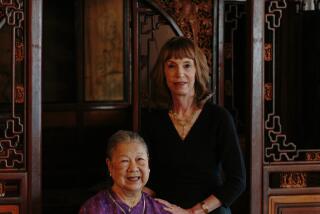Alcott’s ‘Women’ Set an All-American Archetype
- Share via
Anyone familiar with the biography of Louisa May Alcott, author of the sentimental juvenile classic “Little Women,” must have been puzzled by the discussion in your columns (“Not So ‘Little Women,’ ” Dec. 27; “What ‘Little Women’ Is Really About,” Jan. 9) of the relevance of feminism and the political correctness of the recent film remake.
As is well known, Louisa May Alcott drew heavily on her own family life in writing “Little Women.” As in the novel, she was the second of four daughters who parallel exactly the March sisters: the eldest, proper, virtuous and a bit boring; the second, an impulsive tomboy with a gift for dramatic invention; third, the ethereal angel who wastes away at an early age and, finally, the baby of the family, pretty, vain and somewhat selfish. Central to this great study of female bonding is the strong mother about whom her “little women” revolve and evolve.
Almost entirely absent from the novel and films is the personage of Louisa May Alcott’s father, Bronson, the pedagogue of the transcendentalist movement. The reasons for his absence are not far to seek.
Although he and his fellow philosophers believed that children are morally perfect, born into this world “trailing clouds of glory,” Bronson Alcott seems to have made an exception of his daughters, and most particularly Louisa May, whose strong will he consistently sought to subdue. While her sisters conformed to the conventional Victorian model of femininity, Louisa May, burdened by the feeling that she had been born with a boy’s independent spirit, was made by her father to feel a sexual misfit (although many considered her the most attractive of the Alcott girls).
They may have been progressive for their day, but the transcendentalists were not by any means feminists. The only woman among their leaders, Margaret Fuller, was ridiculed by colleagues as well as critics (Nathaniel Hawthorne caricatured her in one of his novels) as an unsexed “bluestocking,” an epithet of choice in those days for assertive women of an intellectual bent. Transcendentalism offered women the chance to be sublime, one of Alcott’s biographers notes, but not to be human.
There is yet another explanation in the family history for the absence of the father in this autobiographical novel. Bronson Alcott, who as a father has been described as cold, reproachful and arbitrary, was also frequently absent.
A great gadabout, utterly impractical and generally improvident, he left the support of his family to his wife and daughters. Bronson Alcott did not go to the Civil War, as the March girls’ father does; rather, it was Louisa May who enlisted, as a nurse (her father joked, somewhat less than kindly, that he was sending his only son.)
Louisa May’s Civil War experience was brief and disastrous: She soon fell ill and was probably dosed with calomel, according to then-conventional wisdom, resulting in a lifelong struggle with the effects of mercury poisoning.
Ironically, the one aspect of Victorian femininity that she fulfilled was chronic invalidism. Nonetheless, driven by necessity and her private demons, she continued to write. But not even the fame and fortune that she earned as a writer (“Little Women” was an immediate success when it was published in 1868) seem to have brought her any measure of peace or fulfillment. She lived out her life as a tortured Victorian spinster, dying just two days after her father.
Ask any group of American girls with which of the March sisters they identify and nine out of 10 will name Jo, the irrepressible tomboy. In creating Jo out of her own stifled longings, Alcott gave us this all-American archetype, a role model that continues to speak to us across the generations, regardless of the politically correct-ism of that day or this.
More to Read
Only good movies
Get the Indie Focus newsletter, Mark Olsen's weekly guide to the world of cinema.
You may occasionally receive promotional content from the Los Angeles Times.










